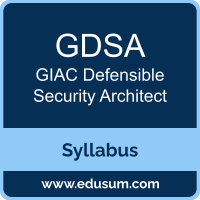 Use this quick start guide to collect all the information about GIAC GDSA Certification exam. This study guide provides a list of objectives and resources that will help you prepare for items on the GIAC Defensible Security Architect (GDSA) exam. The Sample Questions will help you identify the type and difficulty level of the questions and the Practice Exams will make you familiar with the format and environment of an exam. You should refer this guide carefully before attempting your actual GIAC Defensible Security Architect (GDSA) certification exam.
Use this quick start guide to collect all the information about GIAC GDSA Certification exam. This study guide provides a list of objectives and resources that will help you prepare for items on the GIAC Defensible Security Architect (GDSA) exam. The Sample Questions will help you identify the type and difficulty level of the questions and the Practice Exams will make you familiar with the format and environment of an exam. You should refer this guide carefully before attempting your actual GIAC Defensible Security Architect (GDSA) certification exam.
The GIAC GDSA certification is mainly targeted to those candidates who want to build their career in Cyber Defense domain. The GIAC Defensible Security Architect (GDSA) exam verifies that the candidate possesses the fundamental knowledge and proven skills in the area of GIAC GDSA.
GIAC GDSA Exam Summary:
| Exam Name | GIAC Defensible Security Architect (GDSA) |
| Exam Code | GDSA |
| Exam Price | $999 (USD) |
| Duration | 120 mins |
| Number of Questions | 75 |
| Passing Score | 63% |
| Books / Training | SEC530: Defensible Security Architecture and Engineering: Implementing Zero Trust for the Hybrid Enterprise |
| Schedule Exam | GIAC |
| Sample Questions | GIAC GDSA Sample Questions |
| Practice Exam | GIAC GDSA Certification Practice Exam |
GIAC GDSA Exam Syllabus Topics:
| Topic | Details |
|---|---|
|
Cloud-based Security Architecture
|
- The candidate will show an understanding of the concepts involving cloud security, securing on-premise hypervisors, network segmentation, surface reduction, delivery models, and container security.
|
|
Data Discovery, Governance, and Mobility Management
|
- The candidate will demonstrate an understanding of file classification, Data Loss Prevention (DLP), database governance, and Mobile Device Management (MDM).
|
|
Data-Centric Security
|
- The candidate will demonstrate an understanding of the concepts involving data-centric security. Specifically, have an understanding of reverse proxies, web application firewalls, database firewalls, and database activity monitoring.
|
|
Fundamental Layer 3 Defense
|
- The candidate will demonstrate an understanding of the concepts related to securing basic Layer 3 hardware, protocols and services and have an awareness of common attack vectors. In particular, demonstrate a knowledge of CIDR, Layer 3 routing attacks and mitigations, Layer 2/3 benchmark and auditing tools, securing SNMP and NTP protocols, and bogon filtering.
|
|
Fundamental Security Architecture Concepts
|
- The candidate will demonstrate a basic understanding of the concepts of perimeter-focused deficiencies, presumption of compromise, Zero Trust Model, Intrusion Kill Chain, Diamond Model, software-defined networking, micro-segmentation, threat vector analysis and attack surface analysis.
|
| IPv6 |
- The candidate will demonstrate an understanding of the concepts of IPV6. Specifically,have an understanding of addressing, dual stack systems, tunneling; and IPv6 router advertisement attacks and mitigation.
|
|
Layer 1/Layer 2 Defense
|
- The candidate will demonstrate an understanding of the concepts related to securing Layer 1 and Layer 2 services, applications and protocols and be aware of common vectors for these attacks. Specifically,have an understanding of the structure and deployment of VLANs, CDP, MAC spoofing, ARP cache poisoning, DHCP starvation, VLAN hopping, 802.1X, and NAC.
|
|
Network Defenses
|
- The candidate will demonstrate an understanding of the concepts related to network defense. In particular, show a knowledge of NIDS, NIPS, network security monitoring, sandboxing, encryption, and DDOS protections.
|
|
Network Encryption and Remote Access
|
- The candidate will demonstrate an understanding of secure remote access, dual factor for all remote access VPNs and Jump Boxes.
|
|
Network Proxies and Firewalls
|
- The candidate will demonstrate an understanding of Web proxies,SMTP proxies, and next generation firewalls.
|
|
Zero Trust Endpoints
|
- The candidate will show an understanding of the concepts of securing Zero Trust Endpoints. In particular, demonstrate an understanding of patching via automation, end-user privilege reduction, host hardening, host IDS/IPS; endpoint firewalls, and scaling endpoint log collection.
|
|
Zero Trust Fundamentals
|
- The candidate will demonstrate an understanding of the concepts involving Zero Trust Architecture, credential rotation, and responding to pivoting adversaries and insider threats.
|
|
Zero Trust Networking
|
- The candidate will demonstrate a basic understanding of the concepts of Zero Trust Networking. Specifically, demonstrate an understanding of authenticating and encrypting endpoint traffic, Domain Isolation, Single Packet Authentication, red herring defenses, and proactive defenses to change attacker behaviors.
|
To ensure success in GIAC GDSA certification exam, we recommend authorized training course, practice test and hands-on experience to prepare for GIAC Defensible Security Architect (GDSA) exam.
